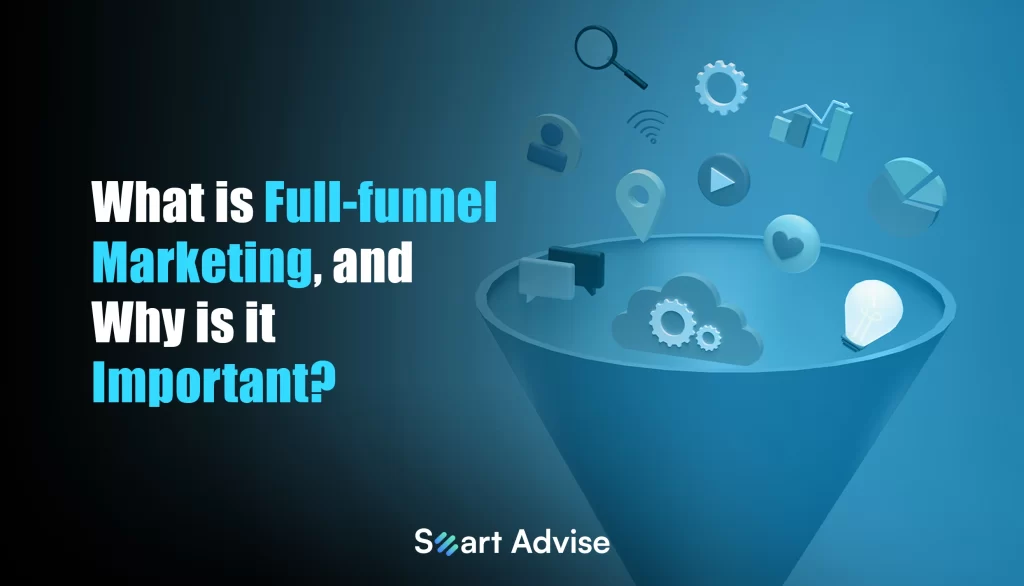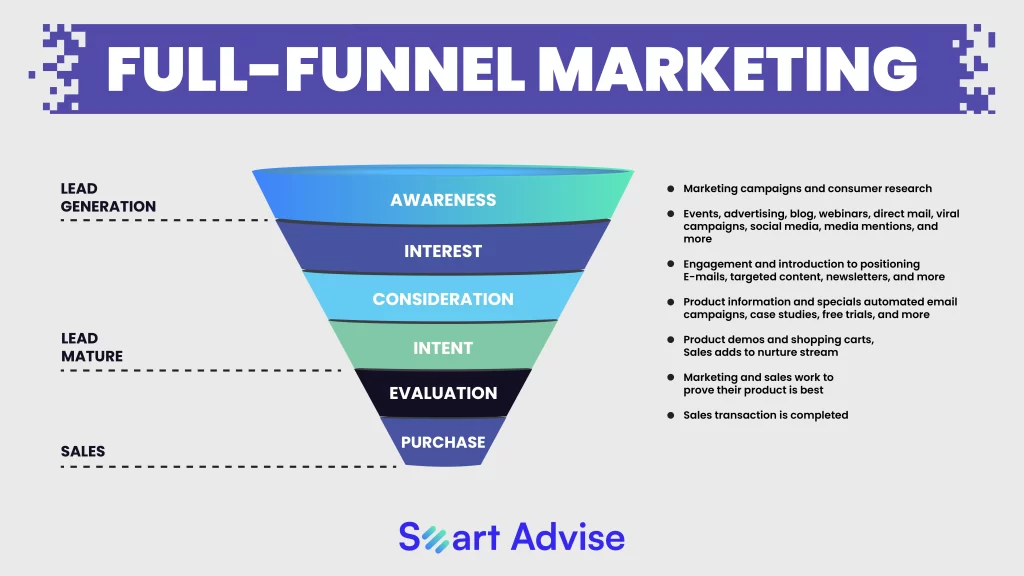
Let your business grow with full-funnel marketing, covering each and every aspect of an ideal marketing operation, resulting in high revenue and retention rates
A great product never appears out of the blue. There’s strategic planning and execution that lie behind it. A multi-chapter marketing operation needs to be undertaken to make a product successful, and this is what is called Full-funnel marketing. This strategy is a complete bible to making or breaking a product. It covers everything from research and quality checks to launching and distribution. However, how can it be properly channeled? Even if you fail in one aspect, it takes very little to turn a campaign into a big fiasco. To ensure this doesn’t happen, let’s discuss it further, starting with…
Understanding Full-Funnel Marketing
Full-funnel marketing is considered as a holistic strategy that acknowledges the multi-stage nature of the customer journey. This approach divides the marketing process into three main stages:
Top of Funnel (ToFu) : This is the awareness stage, where potential customers first encounter your brand. It’s about grabbing their attention and making a positive first impression. Content in this stage is designed to educate, entertain, or inspire, rather than directly sell products or services.
Middle of Funnel (MoFu) : In this stage, customers have shown interest and are considering your offerings. The focus is on nurturing and providing valuable information that helps them make informed decisions. Content here often includes case studies, product demos, and comparison guides.
Bottom of Funnel (BoFu) : This is the conversion stage. Potential customers are ready to make a decision, and your content should push them towards a purchase. It can include product details, pricing, and persuasive content.

Full-funnel marketing is about creating a seamless, personalized experience for customers as they move through these stages. It requires an understanding of the customer’s needs and behavior at each stage and the ability to deliver the right message through the right channel at the right time.
Full funnel marketing makes a way to seamless, personalized experience for customers throughout the buyer’s journey
Why Full-Funnel Marketing Matters
Improved Customer Experience : Full-funnel marketing ensures that customers receive relevant content at every stage by addressing the entire customer journey, this personalized approach improves the customer experience and builds trust, which is crucial for long-term relationships.
Increased Conversions : Targeted content and nurturing throughout the funnel increase the likelihood of conversions. According to HubSpot, companies that excel at lead nurturing generate 50% more sales-ready leads at a 33% lower cost.
Boosted ROI: Full-funnel marketing optimizes your marketing budget by focusing on what works best at each stage. This means you’re not wasting resources on uninterested prospects, resulting in a better return on investment.
Data-Driven Decision Making : With a full-funnel approach, you gather data at every stage, allowing you to refine your strategy continuously. You can see what’s working and what’s not, enabling data-driven decisions that help you improve.
Customer Retention: Full-funnel marketing doesn’t stop at conversion; it continues into post-purchase nurturing. According to Adobe (Published in Yotpo), repeat customers are responsible for 40% of an e-commerce store’s revenue. Engaging existing customers keeps your revenue flowing.
The Power of Full-Funnel Marketing in Numbers
To better understand the significance of full-funnel marketing, let’s delve into some statistics from leading publishers in the industry.
Content Personalization : According to Epsilon, 80% of consumers tend to buy from the brands who provide them with a personalized experience.
Lead Nurturing : HubSpot reports that businesses that use marketing automation to nurture prospects see a 451% increase in qualified leads.
Conversion Rate Optimization : Data from Econsultancy (Published in Saleslion) indicates that for every $92 spent acquiring customers, only $1 is spent converting them.
Customer Retention : Bain & Company research shows that increasing customer retention rates by 5% increases profits by 95%.
Multi-Channel Marketing : According to Adobe Business, customers who engage with a brand on multiple channels have a 250% higher engagement rate than those who don’t.
Content Marketing: HubSpot found that companies that publish 16+ blog posts per month get 3.5 times more inbound traffic than those that publish 0-4 monthly posts.
These statistics highlight the effectiveness of full-funnel marketing strategies. From personalized content to lead nurturing and multi-channel approaches, the numbers speak volumes about the positive impact this strategy can have on your business’s bottom line.
Implementing Full-Funnel Marketing
Now that we’re aware of the importance of full-funnel marketing, how can you implement it effectively?
Audience Segmentation : Start by segmenting your audience based on their stage in the funnel and their needs. This enables you to develop material that is relevant to every segment of the audience.
Content Mapping : Create content tailored to each stage of the funnel. ToFu content should be attention-grabbing and informative, MoFu content should nurture, and BoFu content should guide toward conversion.
Multi-Channel Approach : Be where your audience is. Utilize email, social media, content marketing, PPC advertising, and any other channels that make sense for your target audience.
Marketing Automation : Invest in marketing automation tools to streamline the process and deliver the right content to the right people at the right time.
Data Analysis : Continuously analyze data to understand what’s working and what’s not. Use this insight to adjust your strategy and improve results.
Customer Retention : Don’t forget about customers after the sale. Maintain relationships through post-purchase content, loyalty programs, and exceptional customer service.
Full-funnel marketing is not a one-size-fits-all solution, as it varies greatly depending on your industry, target audience, and the complexity of your sales process. However, its principles can be applied to almost any business, ensuring that you’re addressing the needs and interests of potential customers at all stages of their journey.
In conclusion
The result of full-funnel marketing is tangibly great, as it covers absolute minute details which are needed to run a successful marketing campaign. The strategy may differ for your business, considering the industry you’re in, the sales cycle, scale, and target audience. But its basic principle is applicable for almost every business irrespective of scale, size, industry and audience. Full funnel strategy helps your business to grow sustainably in the long run. To get this strategy right in the action, connect with us at Smart Advise right away!